中考英语复习语法突破第十节非谓语动词课件(共47张PPT)
文档属性
| 名称 | 中考英语复习语法突破第十节非谓语动词课件(共47张PPT) |  | |
| 格式 | ppt | ||
| 文件大小 | 594.5KB | ||
| 资源类型 | 教案 | ||
| 版本资源 | 通用版 | ||
| 科目 | 英语 | ||
| 更新时间 | 2024-03-01 17:01:14 | ||
图片预览



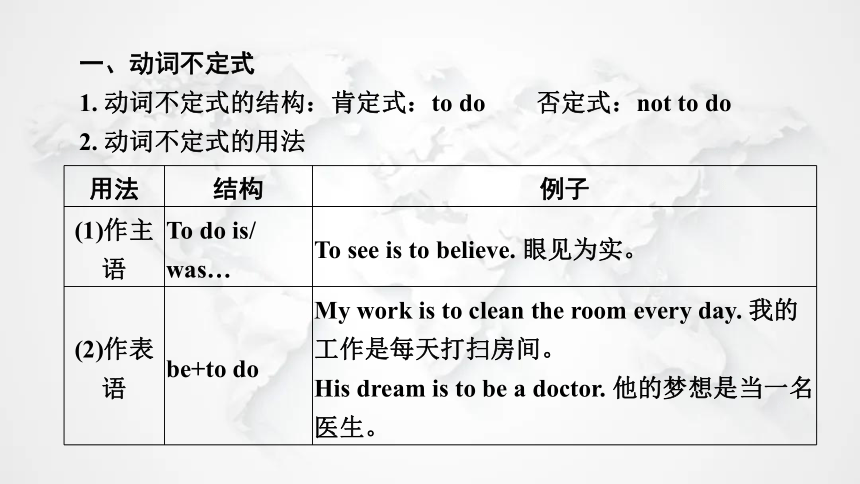
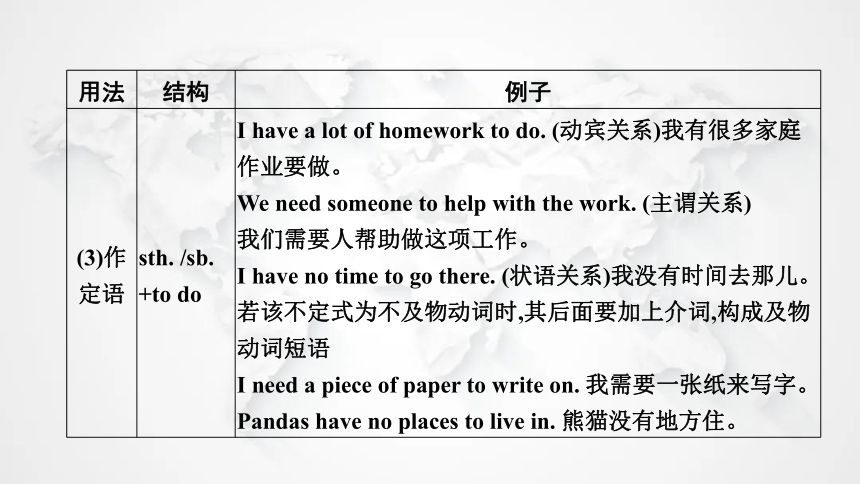
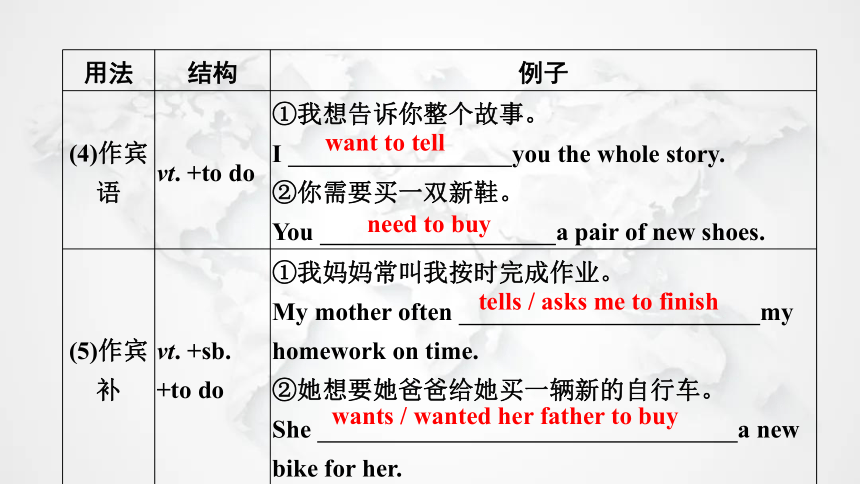
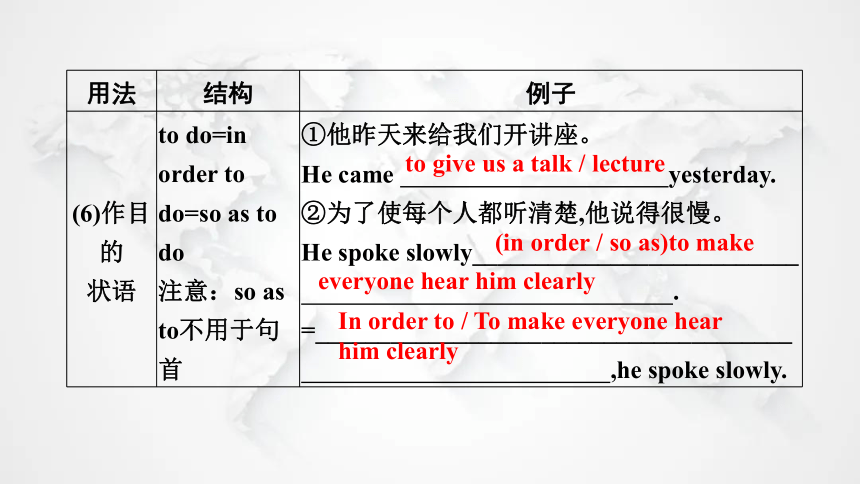
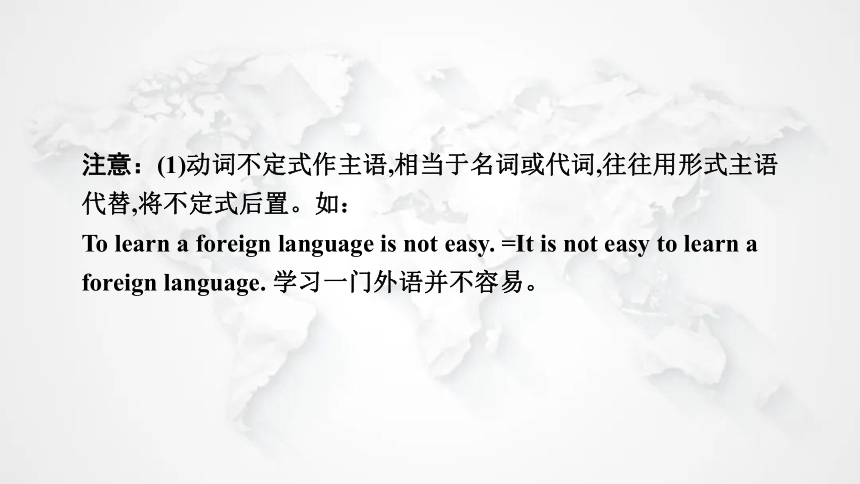
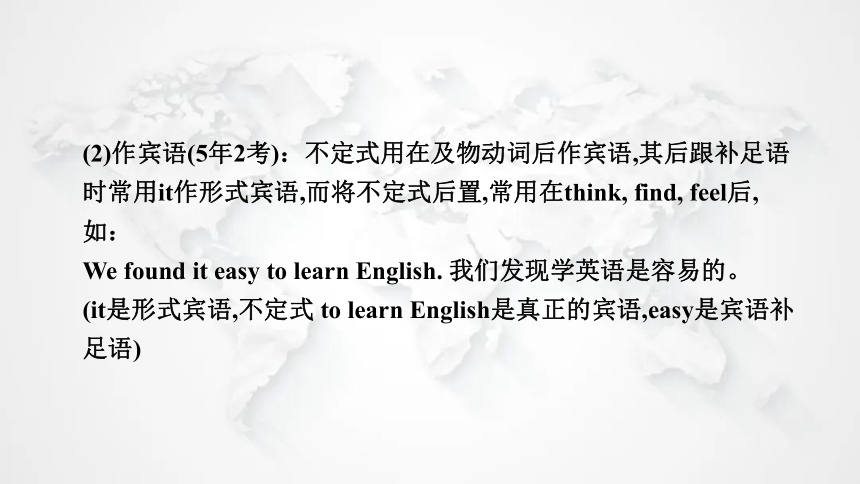
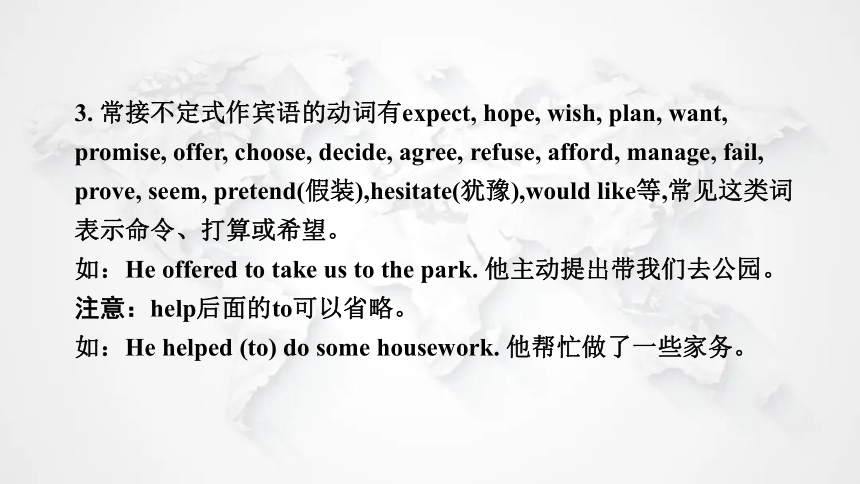


文档简介
(共47张PPT)
考点解读
01
KAO DIAN JIE DU
满分突破
02
MAN FEN TU PO
真题链接
03
ZHEN TI LIAN JIE
CONTENTS
目录
模拟突破
04
MO NI TU PO
考点解读
KAO DIAN JIE DU
PART ONE
01
第十节 非谓语动词
动词的非谓语形式分为:动词不定式、动名词、分词(现在分词和过去分词)。新课程标准要求掌握的是动词不定式作宾语、宾语补足语和目的状语。某些动词后只能接动名词是动名词的主要考点。近几年的中考题都主要考查动词不定式。
动词不定式作宾语5年2考,作宾补5年2考,作目的状语5年1考,动名词5年0考。
一、动词不定式
1. 动词不定式的结构:肯定式:to do 否定式:not to do
2. 动词不定式的用法
用法 结构 例子
(1)作主语 To do is/
was… To see is to believe. 眼见为实。
(2)作表语 be+to do My work is to clean the room every day. 我的工作是每天打扫房间。
His dream is to be a doctor. 他的梦想是当一名医生。
用法 结构 例子
(3)作定语 sth. /sb. +to do I have a lot of homework to do. (动宾关系)我有很多家庭作业要做。
We need someone to help with the work. (主谓关系)
我们需要人帮助做这项工作。
I have no time to go there. (状语关系)我没有时间去那儿。
若该不定式为不及物动词时,其后面要加上介词,构成及物动词短语
I need a piece of paper to write on. 我需要一张纸来写字。
Pandas have no places to live in. 熊猫没有地方住。
用法 结构 例子
(4)作宾语 vt. +to do ①我想告诉你整个故事。
I you the whole story.
②你需要买一双新鞋。
You a pair of new shoes.
(5)作宾补 vt. +sb. +to do ①我妈妈常叫我按时完成作业。
My mother often my homework on time.
②她想要她爸爸给她买一辆新的自行车。
She a new bike for her.
want to tell
need to buy
tells / asks me to finish
wants / wanted her father to buy
用法 结构 例子
(6)作目的
状语 to do=in order to do=so as to do
注意:so as to不用于句首 ①他昨天来给我们开讲座。
He came yesterday.
②为了使每个人都听清楚,他说得很慢。
He spoke slowly__________________________
.
=______________________________________
,he spoke slowly.
to give us a talk / lecture
(in order / so as)to make
everyone hear him clearly
In order to / To make everyone hear him clearly
注意:(1)动词不定式作主语,相当于名词或代词,往往用形式主语代替,将不定式后置。如:
To learn a foreign language is not easy. =It is not easy to learn a foreign language. 学习一门外语并不容易。
(2)作宾语(5年2考):不定式用在及物动词后作宾语,其后跟补足语时常用it作形式宾语,而将不定式后置,常用在think, find, feel后,
如:
We found it easy to learn English. 我们发现学英语是容易的。
(it是形式宾语,不定式 to learn English是真正的宾语,easy是宾语补足语)
3. 常接不定式作宾语的动词有expect, hope, wish, plan, want, promise, offer, choose, decide, agree, refuse, afford, manage, fail, prove, seem, pretend(假装),hesitate(犹豫),would like等,常见这类词表示命令、打算或希望。
如:He offered to take us to the park. 他主动提出带我们去公园。
注意:help后面的to可以省略。
如:He helped (to) do some housework. 他帮忙做了一些家务。
4. 常接不定式作宾补的动词有ask, tell, teach, want, wish, warn, allow, force, would like, help, encourage, advise, order, invite, persuade等。
如:I advised him to read more English books after class. 我建议他课后多看英文书。
注意:help sb. to do中的to也可以省略。
如:He helped his mother (to) do some housework. 他帮助他妈妈做了一些家务。
二、动名词
动名词是一种兼有动词和名词功能的非谓语动词。
1. 动名词的结构:由“动词原形+-ing” 构成,其否定形式直接在动名词前加not。
2. 动名词的用法:动名词具有名词的性质,因此在句中可以作主语、表语、定语、宾语等。
用法 结构 例子
(1)作主语 doing…
is/was… ①Reading is an art. 读书是一种艺术。
②打篮球和听音乐都很有趣。
are
interesting.
(2)作表语 be+
doing Your task is cleaning the windows.
=Cleaning the windows is your task.
=Your task is to clean the windows. 你的任务就是擦窗户。
Playing basketball and listening to music
用法 结构 例子
(3)作定语 — walking stick 手杖 washing machine 洗衣机
reading room 阅览室 sleeping boy 在睡觉的男孩
(4)作动词
的宾语 v. +doing ①他每天练习弹钢琴。
He practices every day.
②你看完这本小说了吗?
Have you finished ?
playing the piano
reading this novel
用法 结构 例子
(5)作介词
的宾语 prep. +doing ①李平正考虑为下学期制订新的计划。
Li Ping for the next term.
②我们盼望收到你的来信。
We your letter.
is thinking about making a new plan
are looking forward to receiving
三、易错点突破
(一)既可以接不定式又可以接动名词作宾语的动词
1. 意思没什么区别的动词:begin, start, hate, like, love。
如:It began to rain. =It began raining. 开始下雨了。
2. 接动词不定式或动名词表达的意思有差别的动词:forget, remember, stop。如:
(1)forget to do sth. 忘记要做某事(还没做) forget doing sth. 忘记做过某事(已做)
(2)remember to do sth. ;remember doing sth.
①记得要做某事(还没做)
②记得做过某事(已做)
remember to do sth.
remember doing sth.
(3)regret to do sth. ;regret doing sth.
①对未做的事感到遗憾(未做)
②对做过的事感到遗憾,后悔(已做)
(4)stop to do sth. ;stop doing sth.
①停下来去做某事(去做另一件事)
②停止做某事(不做了)
regret to do sth.
regret doing sth.
stop to do sth.
stop doing sth.
(5)go on to do sth. 继续去做某事(继续做不同的事)
go on doing sth. 继续不停地做某事(同一动作的继续)
(6)try to do sth. 努力做某事
try doing sth. 尝试做某事
(7)mean to do sth. 打算做某事
mean doing sth. 意味着做某事
(8)can’t help (to) do sth. 不能帮助做某事
can’t help doing sth. 情不自禁做某事
(二)不定式作宾补时省略to 的情况
1. 不定式在动词“一感(feel)二听(hear, listen to)三让(let, make, have)四看(look at, see, watch, notice)”后作宾补,这时不定式要省略to。
(1)在使役动词后:let, make等(get除外,get sb. to do sth. )。
如:老板让他们工作了一整晚。The boss makes them ___________ the whole night.
work
(2)在感官动词后:see, hear, watch, notice, sound, feel等。
如:①我常常看见他们打扫教室。I often see them __________ the classroom.
注意:这类动词如用于被动语态,应接带to不定式作宾补。
如:②他们被迫整晚工作。They were made the whole night.
clean
to work
(3)在表示“看见、听见、感觉某人正在做某事” 时, see, hear, watch, notice, feel, listen to等后通常接doing做宾补。如:
— Did you notice someone passing by? 你注意到有人正经过这儿吗?
— Sure. 当然。
(4)用现在分词与省去to的动词不定式做宾补时,意义有区别:前者表示正在进行(一般用持续性动词),后者表示已经完成。如:
①你听到鸟儿正在树上唱歌吗?Can you hear the bird____________ in the tree?
②我看见他下了公共汽车然后消失了。I saw him the bus and disappear.
singing
get off
2. 其他省略to的动词不定式情况(用动词原形)
(1)情态动词后 (除ought 外,ought to意思是“应该”,是情态动词,只有一种形式)
如:They ought to (should) come tomorrow. 他们明天应当来。
(2)had better(not)do …
如:You had better stay there for a night. 你最好在那儿待一晚。
(3)would rather do … than do …=prefer to do … rather than do … 宁愿做……不愿做……
如:He always prefers to ride a bike rather than ride on a crowded bus. 比起挤公交,他宁愿骑自行车。
(4)Why don’t you do …/why not do …? 为何不做……呢?
(5)Would/Could you please (not) do …? 你能(不)做……吗?
(6)help可带to,也可不带to, help (to) do帮助做……;help sb. (to) do sth. 帮助某人做某事
满分突破
MAN FEN TU PO
PART TWO
02
一、非谓语动词在语法选择中的考查
在语法选择中,非谓语动词的考查以to do的形式比较常见,doing的形式一般是放在介词后面。
1. (2023·广东中考·14题)“I feel like a real astronaut in the space camp, and I don’t even need the earth,” he said.
A. leave B. leaving C. to leave
C
2. (2023·广州中考·4题)He was not fast enough the worms (虫子) Mama Bird brought back.
A. get B. got C. getting D. to get
3. (2022·广东中考·34 题)One day, the teacher told her a test. If she passed the test, she could enter a Beijing Opera school.
A. take B. to take C. taking
D
B
4. (2022·广州中考·6题)My dad asked me it into the kitchen.
A. bring B. bringing C. brought D. to bring
5. (2022·广州中考·11题)“Let’s hurry up and the fish out of the water, Dad!”
A. get B. gets C. got D. getting
D
A
6. (2021·广东中考·38题)Many tourists, they believe,will come______ the fantastic experience of walking across.
A. enjoy B. enjoyed C. enjoying D. to enjoy
7. (2021·广州中考·15题)“And I!” they all said, until a whole shower (阵雨) went down and the corn was saved — all because one little raindrop tried its best what it could.
A. do B. doing C. to do D. did
D
C
8. Many people posted online to pay tribute (致敬) to Yuan after
the success of developing the “giant rice”.
A. to know B. knew C. knows D. knowing
D
二、非谓语动词在短文填空中的考查
在短文填空中,非谓语动词的考查以动名词的形式出现比较常见。先根据语境确定所缺动词,然后再根据语法结构确定非谓语动词的形态。
1. (2021·广州中考·46题)Yuan decided to find a way to rice production and fill people’s bowls.
2. (2021·广州预测)It is difficult for most of the students to__________ this physics problem.
improve
solve
3. (2023·广州一模)It was difficult such a great wall without modern machines.
4. ( 2021·广州模拟)Liu Ming wants to a machine which can help his mother wash the dishes.
5. (2023·广州二模)In order to students to learn English,the school plans to hold an English Week.
to build
buy
encourage
真题链接
ZHEN TI LIAN JIE
PART THREE
03
( )1. The teachers used to key points on the blackboard, but now they are getting used to them through PPTs. (2023·达州市)
A. write; showing B. writing; show C. write; show
A
( )2. — Mike, we are told not the phone while crossing the street.
— I am sorry. I won’t do it again. (2023·自贡市)
A. answering B. to answer C. answer
B
( )3. healthy, we’ve got used to washing hands before meals and using public chopsticks. (2023·南通市)
A. Keeping B. Keep C. To keep D. To keeping
C
( )4. — Is Lucy in the classroom?
— Yeah. She is still there watching Mr. Li . (2023·邵阳市)
A. to draw B. drawing C. draws
B
( )5. We should avoid a noise in the library. (2023·黑龙江省)
A. make B. to make C. making
( )6. — Do you always get up so early?
— Yes. the first bus. My home is far away from school. (2023·内蒙古自治区)
A. To catch B. Catching C. caught D. Catches
C
A
( )7. We hope a beautiful home by living a low-carbon life (低碳生活).
(2023·吉林省)
A. build B. building C. to build
( )8. David learnt when he was five. (2023·天津市)
A. swim B. swims C. swam D. to swim
C
D
( )9. Mike made faces to make his little brother . (2023·甘孜藏族自治州)
A. laughs B. laugh C. to laugh D. laughing
( )10. It also encourages people problems bravely. (2023·西宁市)
A. to solve B. solve C. solving D. to solving
B
A
模拟突破
MO NI TU PO
PART FOUR
04
语法选择
Molly was proud of her flower garden. Her grandmother had raised her and taught her 1 and care for flowers. So her flower garden was 2 in town.
She often ordered a flower magazine 3 the post office. One day, while she 4 through the flower magazine, a picture of a plant caught her eyes. She never saw flowers like that. “I want to have it,” she said to 5 ,and she immediately ordered it.
6 it arrived, she already had a place prepared to plant it. She planted it at the back of her yard. It grew well, with beautiful green leaves all over it, but there were no flowers.
A few weeks later, when standing before the vine (藤),she felt 7 sad that her plant had not bloomed. She was thinking of cutting it down and planting something else in its place. Then her neighbor called over to her, “Thank you so much! You 8 imagine how much I have enjoyed the blooms (花) of that vine you planted. ” The young woman walked through 9 gate into her neighbor’s yard, and she saw that on the other side of the wall the vine was full of amazing blooms.
There were the most beautiful flowers she had ever seen. The vine grew through the cracks (缝隙) and it didn’t bloom on her side of the wall, but it 10 with blooms on the other side.
Sometimes one may not see the good result of his effort, but that doesn’t mean it isn’t successful.
( )1. A. love B. to love C. loving
( )2. A. pretty B. prettier C. the prettiest
( )3. A. to B. from C. for
( )4. A. looked B. had looked C. was looking
( )5. A. her B. herself C. hers
( )6. A. When B. While C. Until
( )7. A. so B. very C. such
( )8. A. needn’t B. can’t C. mustn’t
( )9. A. a B. an C. the
( )10. A. filled B. was filling C. was filled
B
C
B
C
B
A
B
B
C
C
考点解读
01
KAO DIAN JIE DU
满分突破
02
MAN FEN TU PO
真题链接
03
ZHEN TI LIAN JIE
CONTENTS
目录
模拟突破
04
MO NI TU PO
考点解读
KAO DIAN JIE DU
PART ONE
01
第十节 非谓语动词
动词的非谓语形式分为:动词不定式、动名词、分词(现在分词和过去分词)。新课程标准要求掌握的是动词不定式作宾语、宾语补足语和目的状语。某些动词后只能接动名词是动名词的主要考点。近几年的中考题都主要考查动词不定式。
动词不定式作宾语5年2考,作宾补5年2考,作目的状语5年1考,动名词5年0考。
一、动词不定式
1. 动词不定式的结构:肯定式:to do 否定式:not to do
2. 动词不定式的用法
用法 结构 例子
(1)作主语 To do is/
was… To see is to believe. 眼见为实。
(2)作表语 be+to do My work is to clean the room every day. 我的工作是每天打扫房间。
His dream is to be a doctor. 他的梦想是当一名医生。
用法 结构 例子
(3)作定语 sth. /sb. +to do I have a lot of homework to do. (动宾关系)我有很多家庭作业要做。
We need someone to help with the work. (主谓关系)
我们需要人帮助做这项工作。
I have no time to go there. (状语关系)我没有时间去那儿。
若该不定式为不及物动词时,其后面要加上介词,构成及物动词短语
I need a piece of paper to write on. 我需要一张纸来写字。
Pandas have no places to live in. 熊猫没有地方住。
用法 结构 例子
(4)作宾语 vt. +to do ①我想告诉你整个故事。
I you the whole story.
②你需要买一双新鞋。
You a pair of new shoes.
(5)作宾补 vt. +sb. +to do ①我妈妈常叫我按时完成作业。
My mother often my homework on time.
②她想要她爸爸给她买一辆新的自行车。
She a new bike for her.
want to tell
need to buy
tells / asks me to finish
wants / wanted her father to buy
用法 结构 例子
(6)作目的
状语 to do=in order to do=so as to do
注意:so as to不用于句首 ①他昨天来给我们开讲座。
He came yesterday.
②为了使每个人都听清楚,他说得很慢。
He spoke slowly__________________________
.
=______________________________________
,he spoke slowly.
to give us a talk / lecture
(in order / so as)to make
everyone hear him clearly
In order to / To make everyone hear him clearly
注意:(1)动词不定式作主语,相当于名词或代词,往往用形式主语代替,将不定式后置。如:
To learn a foreign language is not easy. =It is not easy to learn a foreign language. 学习一门外语并不容易。
(2)作宾语(5年2考):不定式用在及物动词后作宾语,其后跟补足语时常用it作形式宾语,而将不定式后置,常用在think, find, feel后,
如:
We found it easy to learn English. 我们发现学英语是容易的。
(it是形式宾语,不定式 to learn English是真正的宾语,easy是宾语补足语)
3. 常接不定式作宾语的动词有expect, hope, wish, plan, want, promise, offer, choose, decide, agree, refuse, afford, manage, fail, prove, seem, pretend(假装),hesitate(犹豫),would like等,常见这类词表示命令、打算或希望。
如:He offered to take us to the park. 他主动提出带我们去公园。
注意:help后面的to可以省略。
如:He helped (to) do some housework. 他帮忙做了一些家务。
4. 常接不定式作宾补的动词有ask, tell, teach, want, wish, warn, allow, force, would like, help, encourage, advise, order, invite, persuade等。
如:I advised him to read more English books after class. 我建议他课后多看英文书。
注意:help sb. to do中的to也可以省略。
如:He helped his mother (to) do some housework. 他帮助他妈妈做了一些家务。
二、动名词
动名词是一种兼有动词和名词功能的非谓语动词。
1. 动名词的结构:由“动词原形+-ing” 构成,其否定形式直接在动名词前加not。
2. 动名词的用法:动名词具有名词的性质,因此在句中可以作主语、表语、定语、宾语等。
用法 结构 例子
(1)作主语 doing…
is/was… ①Reading is an art. 读书是一种艺术。
②打篮球和听音乐都很有趣。
are
interesting.
(2)作表语 be+
doing Your task is cleaning the windows.
=Cleaning the windows is your task.
=Your task is to clean the windows. 你的任务就是擦窗户。
Playing basketball and listening to music
用法 结构 例子
(3)作定语 — walking stick 手杖 washing machine 洗衣机
reading room 阅览室 sleeping boy 在睡觉的男孩
(4)作动词
的宾语 v. +doing ①他每天练习弹钢琴。
He practices every day.
②你看完这本小说了吗?
Have you finished ?
playing the piano
reading this novel
用法 结构 例子
(5)作介词
的宾语 prep. +doing ①李平正考虑为下学期制订新的计划。
Li Ping for the next term.
②我们盼望收到你的来信。
We your letter.
is thinking about making a new plan
are looking forward to receiving
三、易错点突破
(一)既可以接不定式又可以接动名词作宾语的动词
1. 意思没什么区别的动词:begin, start, hate, like, love。
如:It began to rain. =It began raining. 开始下雨了。
2. 接动词不定式或动名词表达的意思有差别的动词:forget, remember, stop。如:
(1)forget to do sth. 忘记要做某事(还没做) forget doing sth. 忘记做过某事(已做)
(2)remember to do sth. ;remember doing sth.
①记得要做某事(还没做)
②记得做过某事(已做)
remember to do sth.
remember doing sth.
(3)regret to do sth. ;regret doing sth.
①对未做的事感到遗憾(未做)
②对做过的事感到遗憾,后悔(已做)
(4)stop to do sth. ;stop doing sth.
①停下来去做某事(去做另一件事)
②停止做某事(不做了)
regret to do sth.
regret doing sth.
stop to do sth.
stop doing sth.
(5)go on to do sth. 继续去做某事(继续做不同的事)
go on doing sth. 继续不停地做某事(同一动作的继续)
(6)try to do sth. 努力做某事
try doing sth. 尝试做某事
(7)mean to do sth. 打算做某事
mean doing sth. 意味着做某事
(8)can’t help (to) do sth. 不能帮助做某事
can’t help doing sth. 情不自禁做某事
(二)不定式作宾补时省略to 的情况
1. 不定式在动词“一感(feel)二听(hear, listen to)三让(let, make, have)四看(look at, see, watch, notice)”后作宾补,这时不定式要省略to。
(1)在使役动词后:let, make等(get除外,get sb. to do sth. )。
如:老板让他们工作了一整晚。The boss makes them ___________ the whole night.
work
(2)在感官动词后:see, hear, watch, notice, sound, feel等。
如:①我常常看见他们打扫教室。I often see them __________ the classroom.
注意:这类动词如用于被动语态,应接带to不定式作宾补。
如:②他们被迫整晚工作。They were made the whole night.
clean
to work
(3)在表示“看见、听见、感觉某人正在做某事” 时, see, hear, watch, notice, feel, listen to等后通常接doing做宾补。如:
— Did you notice someone passing by? 你注意到有人正经过这儿吗?
— Sure. 当然。
(4)用现在分词与省去to的动词不定式做宾补时,意义有区别:前者表示正在进行(一般用持续性动词),后者表示已经完成。如:
①你听到鸟儿正在树上唱歌吗?Can you hear the bird____________ in the tree?
②我看见他下了公共汽车然后消失了。I saw him the bus and disappear.
singing
get off
2. 其他省略to的动词不定式情况(用动词原形)
(1)情态动词后 (除ought 外,ought to意思是“应该”,是情态动词,只有一种形式)
如:They ought to (should) come tomorrow. 他们明天应当来。
(2)had better(not)do …
如:You had better stay there for a night. 你最好在那儿待一晚。
(3)would rather do … than do …=prefer to do … rather than do … 宁愿做……不愿做……
如:He always prefers to ride a bike rather than ride on a crowded bus. 比起挤公交,他宁愿骑自行车。
(4)Why don’t you do …/why not do …? 为何不做……呢?
(5)Would/Could you please (not) do …? 你能(不)做……吗?
(6)help可带to,也可不带to, help (to) do帮助做……;help sb. (to) do sth. 帮助某人做某事
满分突破
MAN FEN TU PO
PART TWO
02
一、非谓语动词在语法选择中的考查
在语法选择中,非谓语动词的考查以to do的形式比较常见,doing的形式一般是放在介词后面。
1. (2023·广东中考·14题)“I feel like a real astronaut in the space camp, and I don’t even need the earth,” he said.
A. leave B. leaving C. to leave
C
2. (2023·广州中考·4题)He was not fast enough the worms (虫子) Mama Bird brought back.
A. get B. got C. getting D. to get
3. (2022·广东中考·34 题)One day, the teacher told her a test. If she passed the test, she could enter a Beijing Opera school.
A. take B. to take C. taking
D
B
4. (2022·广州中考·6题)My dad asked me it into the kitchen.
A. bring B. bringing C. brought D. to bring
5. (2022·广州中考·11题)“Let’s hurry up and the fish out of the water, Dad!”
A. get B. gets C. got D. getting
D
A
6. (2021·广东中考·38题)Many tourists, they believe,will come______ the fantastic experience of walking across.
A. enjoy B. enjoyed C. enjoying D. to enjoy
7. (2021·广州中考·15题)“And I!” they all said, until a whole shower (阵雨) went down and the corn was saved — all because one little raindrop tried its best what it could.
A. do B. doing C. to do D. did
D
C
8. Many people posted online to pay tribute (致敬) to Yuan after
the success of developing the “giant rice”.
A. to know B. knew C. knows D. knowing
D
二、非谓语动词在短文填空中的考查
在短文填空中,非谓语动词的考查以动名词的形式出现比较常见。先根据语境确定所缺动词,然后再根据语法结构确定非谓语动词的形态。
1. (2021·广州中考·46题)Yuan decided to find a way to rice production and fill people’s bowls.
2. (2021·广州预测)It is difficult for most of the students to__________ this physics problem.
improve
solve
3. (2023·广州一模)It was difficult such a great wall without modern machines.
4. ( 2021·广州模拟)Liu Ming wants to a machine which can help his mother wash the dishes.
5. (2023·广州二模)In order to students to learn English,the school plans to hold an English Week.
to build
buy
encourage
真题链接
ZHEN TI LIAN JIE
PART THREE
03
( )1. The teachers used to key points on the blackboard, but now they are getting used to them through PPTs. (2023·达州市)
A. write; showing B. writing; show C. write; show
A
( )2. — Mike, we are told not the phone while crossing the street.
— I am sorry. I won’t do it again. (2023·自贡市)
A. answering B. to answer C. answer
B
( )3. healthy, we’ve got used to washing hands before meals and using public chopsticks. (2023·南通市)
A. Keeping B. Keep C. To keep D. To keeping
C
( )4. — Is Lucy in the classroom?
— Yeah. She is still there watching Mr. Li . (2023·邵阳市)
A. to draw B. drawing C. draws
B
( )5. We should avoid a noise in the library. (2023·黑龙江省)
A. make B. to make C. making
( )6. — Do you always get up so early?
— Yes. the first bus. My home is far away from school. (2023·内蒙古自治区)
A. To catch B. Catching C. caught D. Catches
C
A
( )7. We hope a beautiful home by living a low-carbon life (低碳生活).
(2023·吉林省)
A. build B. building C. to build
( )8. David learnt when he was five. (2023·天津市)
A. swim B. swims C. swam D. to swim
C
D
( )9. Mike made faces to make his little brother . (2023·甘孜藏族自治州)
A. laughs B. laugh C. to laugh D. laughing
( )10. It also encourages people problems bravely. (2023·西宁市)
A. to solve B. solve C. solving D. to solving
B
A
模拟突破
MO NI TU PO
PART FOUR
04
语法选择
Molly was proud of her flower garden. Her grandmother had raised her and taught her 1 and care for flowers. So her flower garden was 2 in town.
She often ordered a flower magazine 3 the post office. One day, while she 4 through the flower magazine, a picture of a plant caught her eyes. She never saw flowers like that. “I want to have it,” she said to 5 ,and she immediately ordered it.
6 it arrived, she already had a place prepared to plant it. She planted it at the back of her yard. It grew well, with beautiful green leaves all over it, but there were no flowers.
A few weeks later, when standing before the vine (藤),she felt 7 sad that her plant had not bloomed. She was thinking of cutting it down and planting something else in its place. Then her neighbor called over to her, “Thank you so much! You 8 imagine how much I have enjoyed the blooms (花) of that vine you planted. ” The young woman walked through 9 gate into her neighbor’s yard, and she saw that on the other side of the wall the vine was full of amazing blooms.
There were the most beautiful flowers she had ever seen. The vine grew through the cracks (缝隙) and it didn’t bloom on her side of the wall, but it 10 with blooms on the other side.
Sometimes one may not see the good result of his effort, but that doesn’t mean it isn’t successful.
( )1. A. love B. to love C. loving
( )2. A. pretty B. prettier C. the prettiest
( )3. A. to B. from C. for
( )4. A. looked B. had looked C. was looking
( )5. A. her B. herself C. hers
( )6. A. When B. While C. Until
( )7. A. so B. very C. such
( )8. A. needn’t B. can’t C. mustn’t
( )9. A. a B. an C. the
( )10. A. filled B. was filling C. was filled
B
C
B
C
B
A
B
B
C
C
同课章节目录
- 词法
- 名词
- 动词和动词短语
- 动词语态
- 动词时态
- 助动词和情态动词
- 非谓语动词
- 冠词
- 代词
- 数词和量词
- 形容词副词及其比较等级
- 介词和介词短语
- 连词和感叹词
- 构词法
- 相似、相近词比较
- 句法
- 陈述句
- 一般疑问句和否定疑问句
- 特殊疑问句及选择疑问句
- 反意疑问句
- 存在句(There be句型)
- 宾语从句
- 定语从句
- 状语从句
- 主谓一致问题
- 简单句
- 并列句
- 复合句
- 主谓一致
- 主、表语从句
- 名词性从句
- 直接引语和间接引语
- 虚拟语气
- 感叹句
- 强调句
- 倒装句
- 祈使句
- 句子的成分
- 句子的分类
- 题型专区
- 单项选择部分
- 易错题
- 完形填空
- 阅读理解
- 词汇练习
- 听说训练
- 句型转换
- 补全对话
- 短文改错
- 翻译
- 书面表达
- 任务型阅读
- 语法填空
- 其他资料
